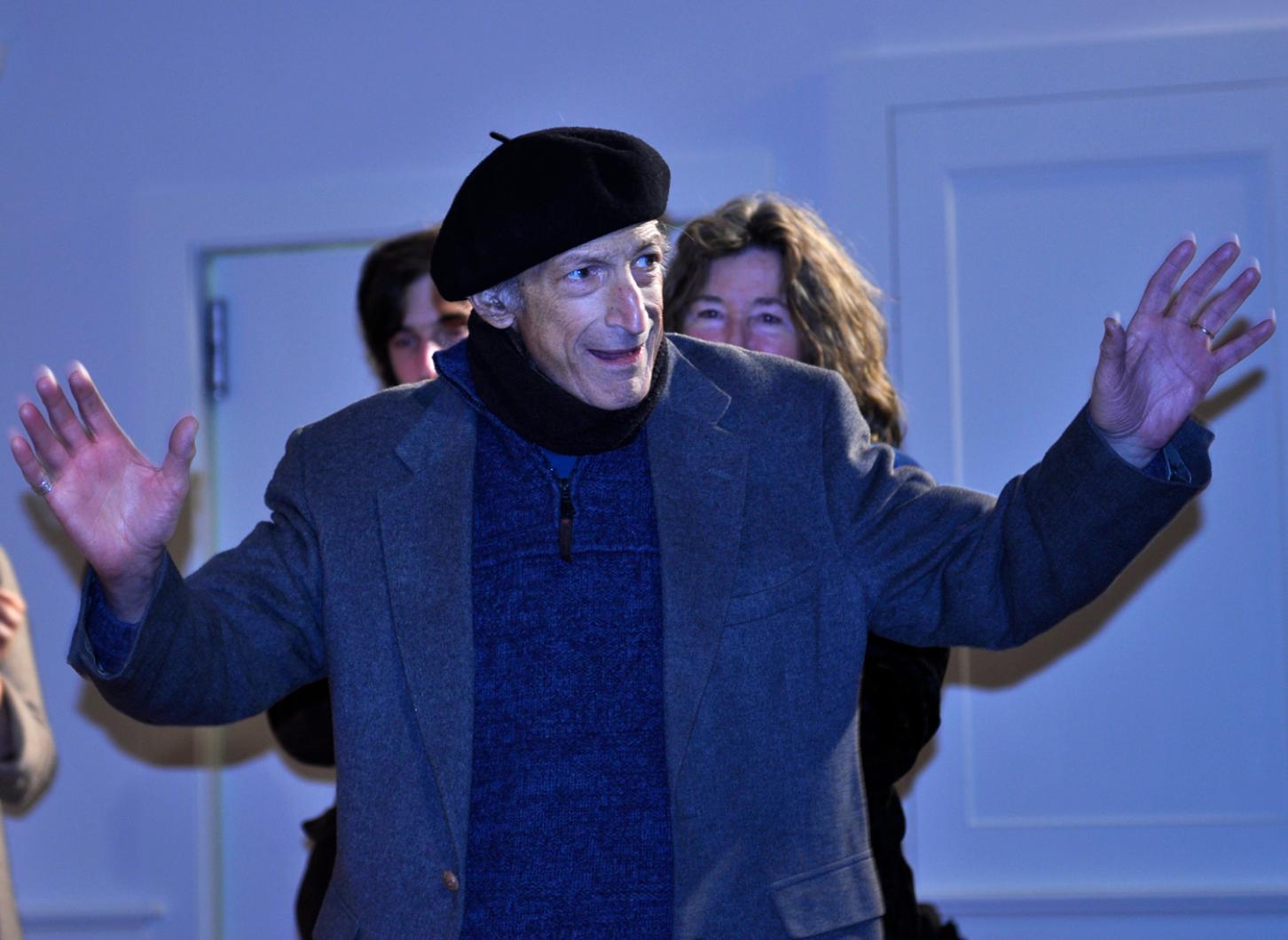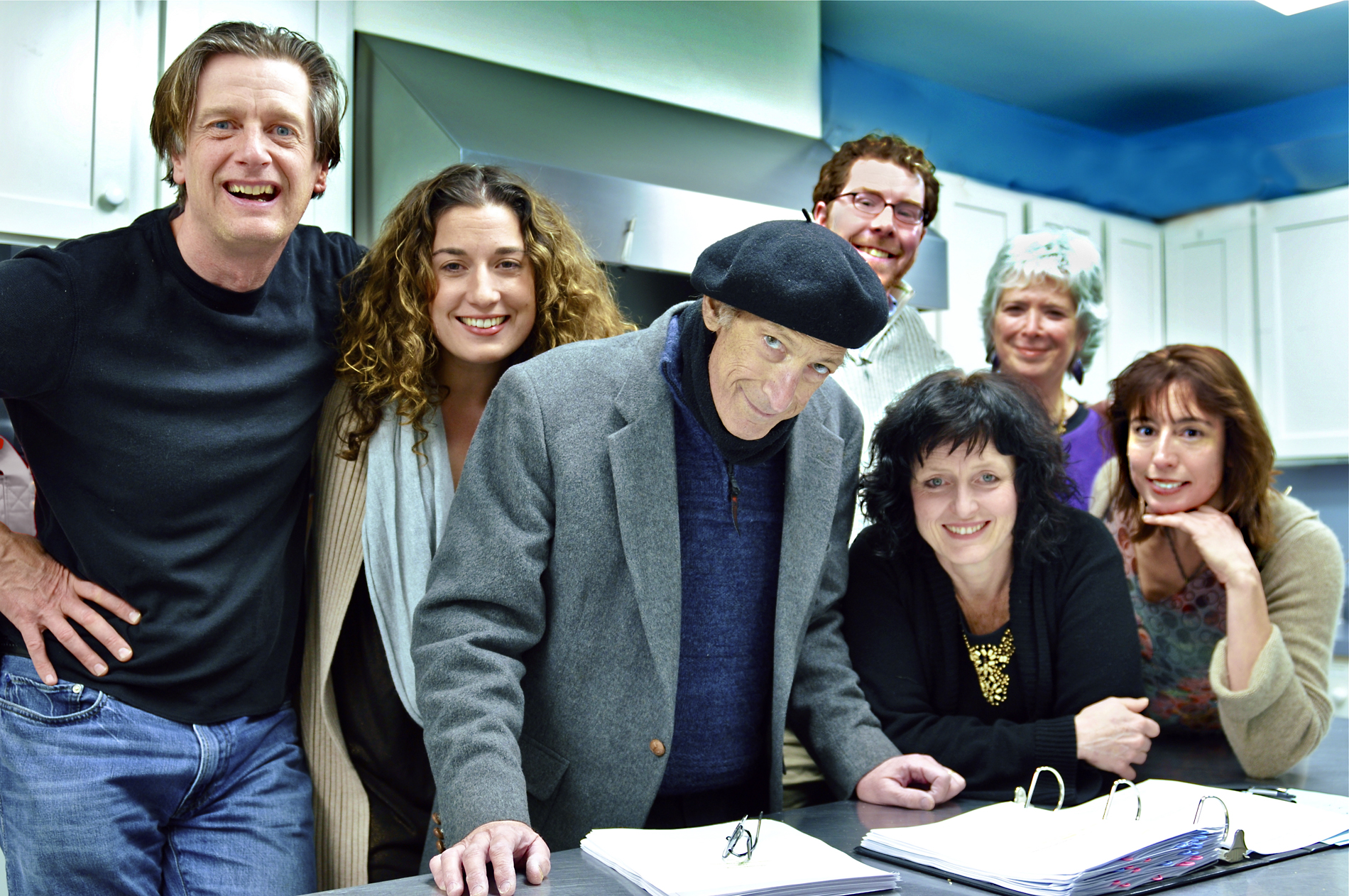Theatre has a more vibrant afterlife than other art forms. Each play is a community event, a coming together of actors and directors interpreting a writer’s vision. With each performance the play takes on a new life and so, in a sense, a playwright’s baby never ages. It just continues to grow with each successive generation.
Jon Lipsky wrote Beginner’s Luck in 1977. The play follows the travails of Saul from the Bible as he finds himself suddenly wearing the uncomfortable crown of king. Last Sunday night at the Hebrew Center, as a tribute to Mr. Lipsky whose health has not been good, this play was performed as a reading by colleagues, former students and friends.
Mr. Lipsky sat on a couch in the front row with his wife, Kanta, and son, Jonah, beside him. He entered the building with the help of a walker but switched to a cane once inside.
In front of Mr. Lipsky the actors brought this early work of his to life. Behind Mr. Lipsky sat a community whose love for his work is exceeded only by their love of the man.
The evening was produced by Brooke Hardman and codirected by Nicole Galland. Ms. Hardman also played the part of the biblical giant killer, David.
A colleague now, Ms. Hardman was once a student of Mr. Lipsky’s at Boston University. At that time she was, like many an 18-year-old headed off to college, extremely nervous.
But on her first day of class, Mr. Lipsky had the students form a circle. Then he asked everyone to tell him about their dreams.
“It’s a pretty cool way to start college, with someone who wants to know your dreams,” Ms. Hardman said. “He was a very fatherly figure. You felt safe to explore and to find out who you really are at age eighteen.”
Ms. Hardman met her husband, Brian Ditchfield, in that classroom. Mr. Ditchfield played Saul on Sunday night.
“I still remember his dream,” Mr. Lipsky said, pointing to Brian after the performance.
“Mine was about my sister,” Mr. Ditchfield said. He was hesitant to elaborate except to say, “It was an important acting and life lesson.” In his defense, his mother, Lynn Ditchfield, stood nearby. She played the part of the musician on Sunday night.
In Mr. Lipsky’s acting class each student creates, by the end of the semester, a play by working with their dreams. This technique of using dream imagery to get at one’s emotional core came to Mr. Lipsky while he was simultaneously undergoing Jungian dream analysis in his personal life and working with Ted McDonough on imagery in playwriting.
“People began having breakthroughs in class,” he said. “They would be crying so deeply because they were being moved by their own imagery. They found a way to their core in a way that surprised me. They were just telling the story of their dreams. They were not trying to impress. And that’s what you want to do with actors, get them present emotionally.”
Mr. Lipsky’s career as a playwright has spanned decades and his works include Living in Exile — A Retelling of the Iliad, The Survivor: A Cambodian Odyssey, Dreaming with an AIDS Patient, After the Apocalypse and Belly of the Whale, to name just a few. All those heavy titles make one wonder about the state of Mr. Lipsky’s dream life and whether slumber for him is solely a somber affair.
But as Sunday night’s performance proved, although the subject matter of Mr. Lipsky’s plays does not shy away from difficult and often tragic stories, his plays are not morose. In fact, they are very, very funny.
“If you only do the pathos, you miss the fact that dreams do not necessarily have a message they are trying to get across,” Mr. Lipsky noted.
In other words, the playwright may have an underlying message, but by tapping into one’s dreams and the images birthed there, the enigmatic and humor-filled quality of life’s journey is preserved.
Two of Mr. Lipsky’s university colleagues, both well versed in his dream imaging classes, traveled to the Island to be a part of the evening.
Paula Langton played the character of Ruth, the witch. Ms. Langton is the head of the acting program at Boston University and teaches a class with Mr. Lipsky. But she started out, as so many did, a starstruck groupie.
“He was among the theatre gods when I was in school,” she said. “One of those really cool people who did amazing theatre.”
Later, when Ms. Langton first applied for a job at Boston University, it was Mr. Lipsky who championed her cause.
“He knew I was applying and he said, ‘Paula, you are exactly what we need, so when you come to this interview just be yourself.’”
Eventually they began teaching a class together, something they have done for the past 14 years.
“Jon set up this class he called Locals. It’s two hours every week where the students can do whatever they want performance-wise.
“Freshmen don’t get to perform formally and so he created this space for them that was informal. We don’t comment on it or judge it. We don’t grade it. We witness the artist getting to play and giving them free rein to see how far they can go. It’s such a gift.
“The hardest thing for me is that this semester is going to be the first semester I will be sitting there without Jon next to me. I can’t even think of doing it next week without him.”
Ms. Langton begins a new semester of teaching Locals on Monday, Jan. 24. But as much as the coming semester will be difficult for her, she will hold dear last Sunday night’s performance.
“I was so moved by the community that Jon is so clearly a part of. One of the things that Jon has said to me when I get really close-up and eye to eye with him, and he’s amazing because you can really talk to him about mortality and what it’s like to be sick, he looked at me way up-close and he said, ‘I feel loved. I feel so loved.’ And it struck me, seeing Jon in his own community on his own turf and the community of people willing to come out; it felt so right.”
Ms. Langton’s husband, Ken Cheeseman, played the part of Samuel in the play. Mr. Cheeseman is a professor at Emerson College and has worked with dream imaging both with Mr. Lipsky and on his own. Last semester, although already saddled with a full workload, he petitioned to be able to teach Mr. Lipsky’s dream imaging class at B.U. in his absence. He and Ms. Langton felt that strongly that the class must continue.
Sunday night was the first time, however, that Mr. Cheeseman had acted in one of Mr. Lipsky’s plays.
“To gather a group of people together in a space like that, on an Island on a night like that, it really is what life is all about,” he said. “It just validated ... how it is worth it for us to spend a lifetime in the theatre examining these great stories.”
It is a sentiment Mr. Lipsky would agree with wholeheartedly. Referring to his actors on Sunday night, he said, “I’m so proud of them that they love the theatre. The love of theatre is so important to me.”
Mr. Lipsky’s love of theatre and those who create it will continue to reverberate in both the near and long term. In March his play Living in Exile will be performed in Boston as part of the winter festival of Actor’s Shakespeare Project, a company Ms. Langton helped found. Ms. Hardman already has arranged for the actors in this play to spend a weekend on Martha’s Vineyard so they can work with Mr. Lipsky.
In April, Walking the Volcano will be performed as part of Boston Playwrights’ Theatre in connection with the Boston Center for American Performance.
But it is the production of Living With an AIDS Patient, a bit more than a year away, that touches Mr. Lipsky most. That show will be directed by his son, Jonah, as part of his senior thesis at Bennington College.
“I am so very touched that my son likes his dad’s work enough to risk his thesis on my play,” he said. “And that he likes my play’s style enough to keep it going.”
That Mr. Lipsky’s work, both in the theatre and in the classroom, will keep going is a foregone conclusion. Sunday night was just a prelude. But the performance was, according to Mr. Lipsky, just one piece of a larger web of love surrounding him now.
“The community has come out and supported my needs in a way I couldn’t repay, and that is just delightful. People I don’t even know well, wanting to be part of a helping hand. You can’t buy that. You can’t make that. It is either there or it isn’t. And on this Island, it is there.”






Comments
Comment policy »